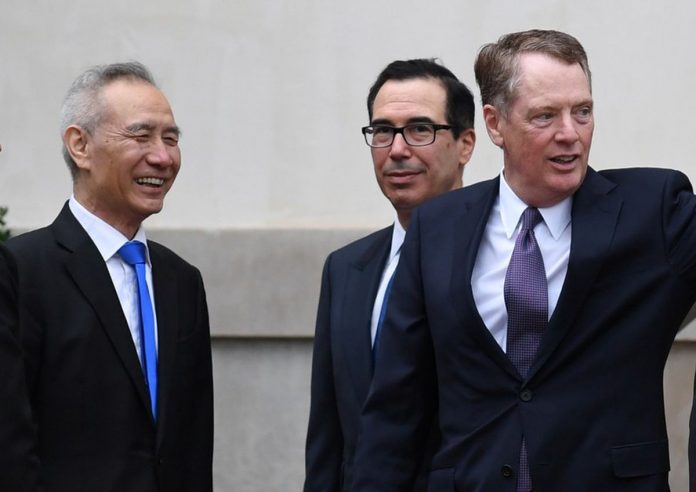WASHINGTON/BEIJING: The top US trade negotiator said on Wednesday it is in the interests of China and the United States to have a successful trade pact and he expects to confer with a senior Chinese official before next week’s G20 summit in Japan where President Donald Trump and Chinese President Xi Jinping are set to meet.
China and the United States, the world’s two largest economies, have agreed to revive trade talks after a long lull in efforts to resolve a costly trade dispute that has put pressure on financial markets and damaged the global economy.
US Trade Representative Robert Lighthizer told a congressional that he will speak by telephone with Liu He, China’s vice premier and chief negotiator in the trade talks, “in the next day and a half” and then expects to meet with him in Osaka, site of the G20 summit, along with US Treasury Secretary Steven Mnuchin before Trump’s meeting there with Xi.
Talks to reach a broad deal broke down last month after US officials accused China of backing away from agreed commitments. Interaction since then has been limited, and Trump has threatened to put more tariffs on Chinese products in an escalation that businesses in both countries want to avoid.
It is unclear when the formal US-China trade negotiations will restart but the United States is “certainly willing to engage” with China in the discussions, Lighthizer told the House of Representatives Ways and Means Committee.
“We have a very unbalanced relationship with China and we have one that risks literally the jobs of the future,” Lighthizer said.
“I think it’s in the interests of both China and the United States to have some kind of successful agreement. The president (Trump) has said he definitely wants an agreement if we can get a great agreement for America,” Lighthizer added.
China said on Wednesday positive outcomes were possible in trade negotiations with the United States, after Trump and Xi agreed to revive their troubled talks at the G20 meeting.
Trump said on Tuesday he would meet Xi at the G20 summit in Osaka. China, which previously declined to say whether the two leaders would get together, confirmed the meeting. The two leaders spoke by telephone on Tuesday.
China has responded to US tariffs with levies of its own. In response to queries from lawmakers about the US trade team’s efforts to get those lifted, Lighthizer said: “Getting rid of those retaliatory tariffs and also new purchases (are) an important part of what we’re working on.”
The CEOs of at least five US companies are scheduled to meet Chinese Premier Li Keqiang this week in Beijing, Bloomberg reported on Wednesday, citing people familiar with the matter. The companies include Dow Inc, United Parcel Service Inc, Pfizer Inc and Honeywell International Inc, Bloomberg reported.
News that the US-Chinese negotiations were back on the agenda boosted China’s stock markets, with the blue-chip CSI300 index ending 1.3pc higher while the Shanghai Composite Index rose 1.0pc.
US stocks were mixed as traders were focused on the Federal Reserve’s policy statement that is expected to open the door to future interest rate cuts.
‘POSITIVE OUTCOMES’
Speaking at a daily news briefing, China’s foreign ministry spokesman Lu Kang said it was important to find a solution that was acceptable to both sides.
“I’m not getting ahead of myself, but communication over four decades shows it is possible to achieve positive outcomes,” Lu said.
“The two leaders will talk about whatever they want,” Lu added. “A deal is not only in the interests of the two peoples but meets the aspirations of the whole world.”
There was fresh evidence on Wednesday of the disruption in supply chains arising from the US-Chinese trade tensions.
Apple Inc has asked its major suppliers to assess the cost implications of moving 15% to 30% of their production capacity from China to Southeast Asia as it prepares for a restructuring of its supply chain, according to a Nikkei Asian Review report on Wednesday.
Apple’s request was a result of the extended Sino-US trade dispute, but a trade resolution will not lead to a change in the company’s decision, Nikkei said, citing multiple sources. The iPhone maker has decided the risks of depending heavily on manufacturing in China are too great and even rising, Nikkei said.
Key iPhone assemblers Foxconn, Pegatron Corp, Wistron Corp, major MacBook maker Quanta Computer Inc, iPad maker Compal Electronics Inc, and AirPods makers Inventec Corp, Luxshare-ICT and Goertek have been asked to evaluate options outside of China, Nikkei reported.
The countries being considered include Mexico, India, Vietnam, Indonesia and Malaysia. India and Vietnam are among the favourites for smartphones, Nikkei said.
In another development, the United States has fined several companies for exporting goods via a Chinese-owned special economic zone in Cambodia in a bid to dodge Trump’s tariffs on Chinese imports, Arend Zwartjes, a US Embassy spokesman in Phnom Penh, told Reuters.
In an intriguing possible sign of a pre-G20 thaw, China’s state television’s movie channel, which has in recent weeks broadcast old patriotic films about China’s heroics against the United States in the 1950-53 Korean War, on Wednesday showed a movie that put the United States in a far more positive light.
The channel showed 1999’s “Lover’s Grief over the Yellow River”, about a US pilot in World War Two who was rescued by Communist guerrilla forces in China and falls in love with one of the young women fighters.
The overseas edition of the ruling Communist Party’s official People’s Daily said on its Weibo account the movie was “deeply moving”, and showed a picture of the lead Chinese actress and lead U.S. actor locked in an embrace.
“It’s better to fall in love than to fight,” the Beijing office of the Communist Youth League wrote of the movie on its Weibo account.




